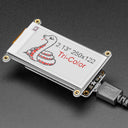Adafruit 2.13" HD Tri-Color eInk / ePaper Display FeatherWing - 250x122 RW Panel with SSD1680
by Adafruit



Easy e-paper comes to your Feather, with this breakout that's designed to make it a breeze to add a tri-color eInk display.
Chances are you've seen one of those new-fangled 'e-readers' like the Kindle or Nook. They have gigantic electronic paper 'static' displays - that means the image stays on the display even when power is completely disconnected. The image is also high contrast and very daylight readable. It really does look just like printed paper!
We've liked these displays for a long time, and they're just about Feather sized, so wouldn't a custom e-paper FeatherWing make a ton of sense? This 'Wing is tested to work with all of our Feathers, from the ESP8266 to the M0. It has built-in memory buffering so it can work with chips as small as the '32u4 and '328. It does use a lot of pins: the 3 SPI pins, and up to 4 control pins to manage the SD card slot and SRAM.
The FeatherWing sports a 2.13" tri-color (red, black, and white) display. It has 250x122 black and red ink pixels and a white-ish background. We used to stock a version of a 2.13" tricolor E-Ink with a lower-resolution display, this version is 250x122 pixels instead of 212x104 pixels and uses a different chipset (SSD1680) so code will need to be recompiled.
Using the CircuitPython or Arduino libraries, you can create a 'frame buffer' with what pixels you want to have activated and then write that out to the display. Most simple breakouts leave it at that. But if you do the math, 250 x 122 pixels x 2 colors = 7.5 KBytes. Which won't fit into many microcontroller memories. Heck, even if you do have 32KB of RAM, why waste 8KB?
So Adafruit did you a favor and tossed a small SRAM chip on the back. This chip shares the SPI port the eInk display uses, so you only need one extra pin. And, no more frame-buffering! You can use the SRAM to set up whatever you want to display, then shuffle data from SRAM to eInk when you're ready. The library Adafruit wrote does all the work for you, you can just interface with it as if it were an Adafruit_GFX compatible display.
They even tossed on a MicroSD socket so you can store images, text files, whatever you like to display. Comes assembled and tested with socket headers that you can plug your Feather right into, no soldering required!
TECHNICAL DETAILS
- Dimensions (excluding mounting holes): 61.5mm x 31.4mm x 6.6mm
- Driver chip is the SSD1680
- Panel variant is RW
Product Weight: 14.5g / 0.5oz
We no longer stock this product
It's sad to say goodbye but sometimes we have to retire products to make way for new things.
You may still be able to buy this product directly from our friends at Adafruit - check out their website!
Shop with confidence – we've been serving the hobbyist electronics, Maker, and retro gaming communities since 2012.
- Satisfaction or refund guarantee
- Worldwide shipping via mail or courier
- 57,000+ customer reviews
- Secure website and payments